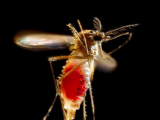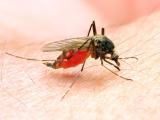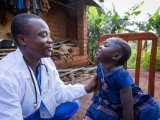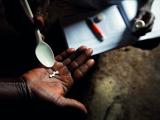A study published today in The Lancet Infectious Diseases adds more evidence that resistance to the recommended drug combination for Plasmodium falciparum malaria is common in parts of Cambodia, confirming the need for other combinations and additional strategies.
Researchers from the US National Institute of Allergy and Infectious Diseases (NIAID) and several other institutions assessed resistance to dihydroartemisinin-piperaquine, Cambodia's first-line treatment for P falciparum malaria, in three provinces that had varying levels of artemisinin resistance. The treatment combines fast-acting and long-acting drugs.
The team enrolled 202 patients with uncomplicated P falciparum infections in Pursat, Preah Vihear, and Ratanakiri provinces, treated them with dihydroartemisinin-piperaquine, and measured their blood parasite levels. After initial clearance, the researchers found, the parasites reemerged in 37 of 81 patients (46%) in Pursat, 10 of 63 patents (16%) in Preah Vihear, and 1 of 60 patients (2%) in Ratanakiri, according to the study.
"The results indicate the ACT [artemisinin combination therapy] is failing in Pursat and Preah Vihear, where artemisinin resistance is common, but remains highly efficacious in Ratanakiri, where resistance is uncommon," the NIAID said in a press release.
Lab tests showed the parasites that reemerged contained a genetic marker of artemisinin resistance and had decreased susceptibility to piperaquine, showing that both artemisinin and piperaquine resistance contributed to treatment failures, the NIAID said.
"However, the parasites also showed an increased susceptibility to mefloquine and completely lacked the molecular marker for mefloquine resistance," the agency said. It added that these findings shaped new World Health Organization guidelines that reinstated artesunate plus mefloquine as the first-line ACT in areas of Cambodia where dihydroartemisinin-piperaquine treatment has failed.
More resistance woes possible
In an accompanying commentary, however, two US Army experts caution that resistance to mefloquine is likely to return quickly now that artesunate-mefloquine has replaced dihydroartemisinin-piperaquine in Cambodian areas where artemisinin resistance is common.
The writers are David Saunders, MD, MPH, of the US Army Medical Materiel Development Activity at Fort Detrick, Md., and Chanthap Lon, MD, of the Armed Forces Research Institute of Medical Sciences in Phnom Penh.
With other effective drug combinations lacking, they suggest, one way to fight resistant malaria in Cambodia would be to hospitalize all malaria patients to ensure full adherence to treatment. They note that that approach is used successfully in the country's tuberculosis control program.
See also:
Jan 8 Lancet Infect Dis abstract
Jan 8 Lancet Infect Dis commentary
Jan 7 NIAID news release




















